Mihai Lukács’ show, Mother, that was rehearsed under the constraints imposed by the pandemic, opened in Bucharest at MNAC on the weekend of 12-13 September. It is a play about what we are living and is happening to us these days. Now, don’t get me wrong, this is not a play about hospitals, pandemics, elections, sidewalks or light rails; nor is it about the ambitious inauguration of the new subway line in Drumul Taberei or the increasingly catastrophic consequences of climate change.
The play Mother is more about a phenomenon that is becoming ever more urgent i.e. living our lives in a world in which the capitalist mechanisms and the spiritual ones have fully merged. In other words, in Lukács’ world, the advertising displayed on buildings transforms itself into a sort of guide on how to live spiritually, a technique that becomes visible especially during crises and natural disasters. Lukács’ new world is supposed to have emerged after the earthquake of ’77, but I would argue that it is also more and more apparent today after Covid-19. Following an American pattern, its origins can be traced to broader formation in which a successful video on Facebook mixes together conspiracies and an obsession for money on the background music of a Christian performer. In this brand new world, feeling inspired means to be chosen by God at the right time of a disaster that will make you special.
The show that was played on the MNAC terrace of the People’s House had a strange atmosphere, amplified by the light of an intense sunset and a wind that gave us the chills. Mother asks us to immerse ourselves in the performance of a pastor (Oana Rusu) and her angelic disciple (Maria Sgârcitu). The stage was cleverly marked, while the black and white combination created the sensation of submersion in the depths of a post-apocalyptic religion (Alex Horghidan and Mișa Dumitriu are to be credited for this very inspired choice). The DJ station was placed at the center of the stage and the actresses were performing against the backdrop of the golden People’s Salvation Cathedral, which is currently being built. The strange feeling you got immediately after stepping out on the terrace could largely be attributed to the sweet sounding Zen music that made you wonder whether a message session was to follow or maybe a Buddhist theatre play or a religious ceremony in line with a q canon (for example the QAnon theory is wreaking havoc in American politics). The play reached an even more weird intensity once several people from the public were invited on stage to sit down and receive the blessing bestowed upon them by Mother – a character played with horrifying vibrancy by Oana Rusu. She told her stories with a type of force that seemed to mimic the style of vloggers like Dana Budeanu who have become popular due to their crude and unconventional way of speaking.
The horror that we experience during Mother is directly linked to how miracles, corporations and wealth have become one entity. The logic of this entity is constituted by terrible prophecies, anecdotes, continuous revelations, and anarchic causal links that only God can explain, but that are very efficient. The logic of sweet horror has nowadays become a sort of global theory that is being popularized mainly through the letter Q and the accompanying story of the stolen children which are held in basements. This particular type of logic has also invaded the science-fiction movies on HBO where, in the new series Raised by Wolves, an android mother is depicted as the new hope for humanity. As is usually the case, the war seems to be centered on stolen children. When it comes to Lukács’ Mother, the scenography is organised around a mother and a daughter – who was maybe stolen as well- but the director smartly leaves enough room for the public to fill the story with actual details. The target, however, could either be the spirituality of the new corporations or the capitalism as a new form of religion.
Mother manages to masterfully capture a historical moment in which the alliance between capital and church is increasingly successful in imposing its own devouring theory. Simple questions like: „Why do we have to wear a mask? What is the cause of economic inequality? Why do some people become ill?” receive various seductive performative answers during the play, like prophecies about beehives and their mothers, the queen bees, delivered by Oana Rusu in her tai-chi squats. Maria Sgârcitu’s music subtly carries you to the sweet risk-free world built around the relationship between an all-seeing mother and her disciples that are hungry for love and spiritual meaning.
Ultimately, the risk that the show has to face is that a truly frightening world materializes only if you believe it. Independent political theatre used to employ an emotional hammer as a preferred method to denounce the capitalist horror, its final goal being to shock the audience with the absurdity of the world it portrays. Perhaps as a response to its roots – the theatre that has to wake you up, right? Lukács’ new play refuses to cause dismay and chooses not to emotionally assault its public. From the very beginning, his play situates itself in the affective reaction of distancing oneself to a vantage point from where one can watch from above what happens on stage. The point of view presented by the play is not that of a former convert who wants to expose the spiritual masquerade, but instead that of a critic who is outraged and scared by what is going on around him. Maybe this is precisely why the stakes of the play seem to be diminished to a certain degree – you do not get to viscerally experience the horror of the new spiritual mothers.
Mother triggers a mocking smile on your face and sometimes makes you burst into laughter, but it does not force you to feel the horror epidermically as if it were your very own world. In the end, the question remains: how efficient is a show that just makes you see the horror without also compelling you to feel real anxiety that what goes on before your eyes can also happen to you? Whereas the emotional impact of the play is not very acute, its merit surely lies in opening a window into a world which we are ever more probable to inhabit from now on, one in which vlogging will become more and more akin to a spiritual act.
Mother
Cast: Oana Rusu, Maria Sgârcitu
Scriptwriter and director: Mihai Lukács
Scenography: Alex Horghidan, Mișa Dumitriu
Songs: music and lyrics by Maria Sgârcitu

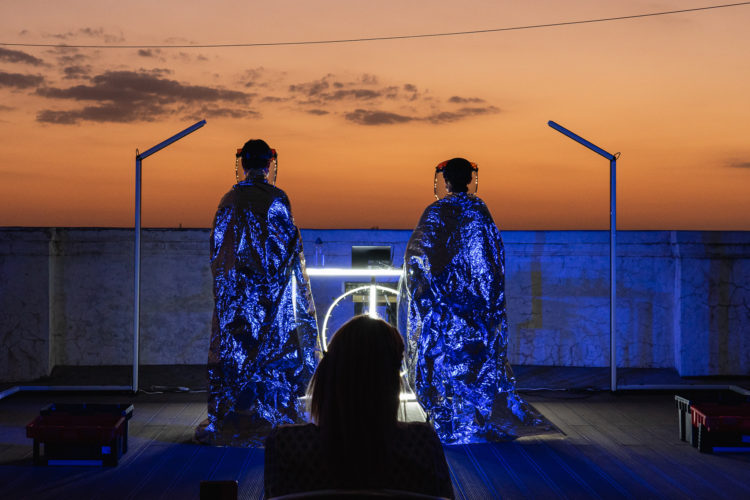
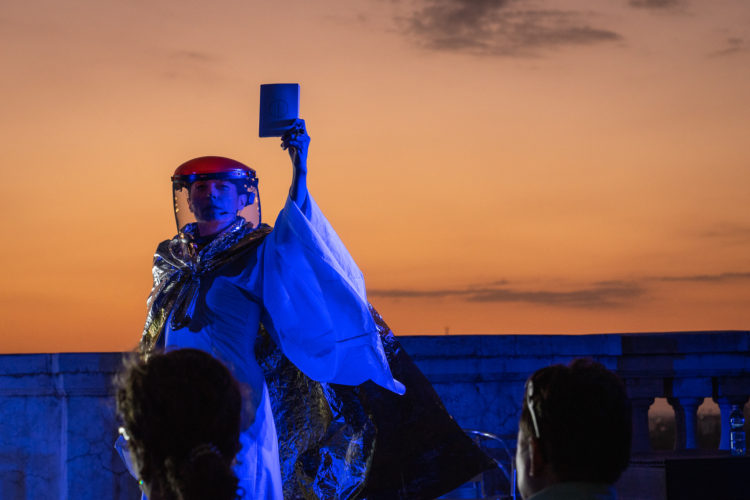
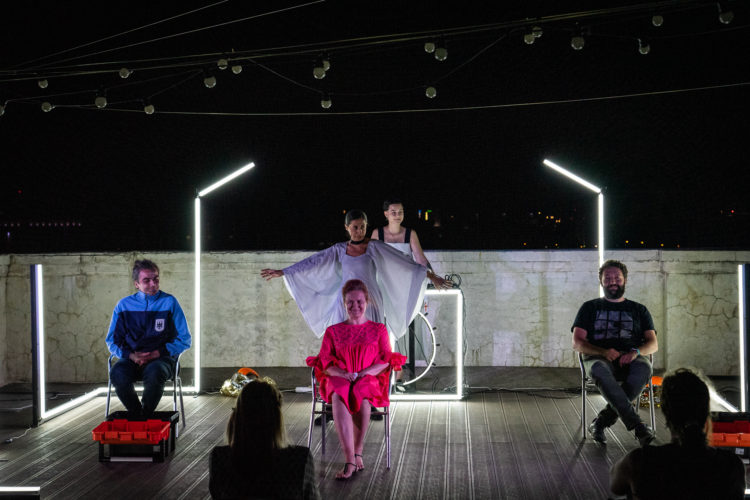
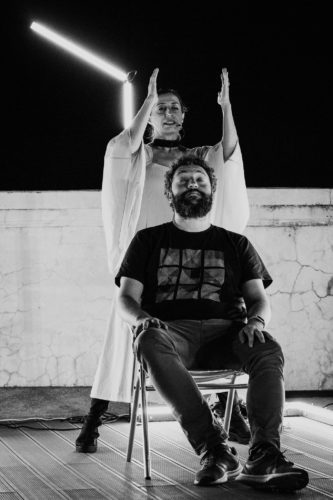
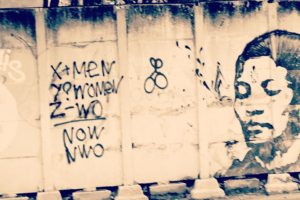
Comments are closed here.